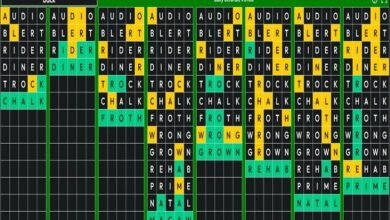
Introduction
“Wordle for Kids” is a tailored version of the widely popular Wordle game, specifically designed to engage and educate younger audiences. While the original Wordle has captured the hearts of word enthusiasts worldwide, Wordle for Kids offers a more accessible and age-appropriate experience. This version of the game not only entertains but also serves as an excellent tool for building vocabulary, improving spelling, and developing critical thinking skills. In this blog post, we’ll explore everything you need to know about Wordle for Kids, including its educational value, gameplay mechanics, and how it can be integrated into learning environments.
The Educational Benefits of Wordle for Kids
Wordle for Kids is more than just a game—it’s a powerful educational tool. The game encourages children to think critically and enhances their language skills. By playing Wordle for Kids, young learners can expand their vocabulary, improve their spelling, and develop a better understanding of word structures. Additionally, the game fosters problem-solving skills as kids try to figure out the correct word based on limited clues. Wordle for Kids makes learning fun and interactive, transforming what might otherwise be a monotonous exercise into an engaging challenge.
How to Play Wordle for Kids: Basic Rules
Wordle for Kids follows the same basic principles as the original Wordle but is simplified to suit younger players. In Wordle for Kids, players are given a set number of attempts to guess a target word. After each guess, the game provides feedback by highlighting letters that are in the correct position or appear in the word but are in the wrong spot. The goal is to guess the word within the allowed attempts. Wordle for Kids often features shorter words and provides additional hints to make the game more accessible to children. This section will guide you through the basic rules and gameplay of Wordle for Kids.
Adapting Wordle for Kids for Different Age Groups
One of the great things about Wordle for Kids is its adaptability to different age groups. Younger children can start with simpler versions of the game that use three or four-letter words and provide more hints. As they grow older and more proficient, the game can be adjusted to include longer words and fewer hints, increasing the challenge. This adaptability makes Wordle for Kids a versatile tool for parents and educators looking to cater to various skill levels. In this section, we’ll explore how to modify Wordle for Kids to suit different age groups and learning stages.
Wordle for Kids in the Classroom: A Teacher’s Guide
Wordle for Kids is an excellent addition to the classroom, offering a fun and interactive way to reinforce language skills. Teachers can incorporate Wordle for Kids into daily lessons, using it as a warm-up activity, a reward for good behavior, or even as part of a spelling or vocabulary lesson. The game can be played individually, in pairs, or in small groups, encouraging collaboration and communication among students. This section provides tips and strategies for integrating Wordle for Kids into the classroom, making learning both fun and effective.
Using Wordle for Kids at Home: A Parent’s Perspective
Parents looking for educational games to support their children’s learning will find Wordle for Kids to be an ideal choice. The game can be easily played at home, either on paper or using a digital platform. It’s a great way to spend quality time with your child while also supporting their educational development. Wordle for Kids can be played as a daily challenge, during long car rides, or as a quiet activity before bed. In this section, we’ll discuss how parents can use Wordle for Kids to reinforce learning and make the game a part of their daily routine.
Wordle for Kids: Digital vs. Paper Versions
Wordle for Kids is available in both digital and paper formats, each offering its own set of advantages. The digital version is convenient, interactive, and often includes additional features such as hints or timers. The paper version, on the other hand, is portable, easy to customize, and can be a great way to limit screen time while still engaging in a fun activity. This section will compare the digital and paper versions of Wordle for Kids, helping you decide which format best suits your needs and preferences.
Fun Variations of Wordle for Kids
To keep the game exciting, there are several fun variations of Wordle for Kids that you can try. These variations can include themed word lists, such as animals, colors, or holidays, or adding a time limit to increase the challenge. Another popular variation is “Reverse Wordle,” where the child creates a word for the parent or teacher to guess. These variations keep the game fresh and engaging, encouraging children to play regularly. In this section, we’ll explore some creative twists on the classic Wordle for Kids game.
The Role of Wordle for Kids in Language Development
Wordle for Kids plays a significant role in language development, particularly in vocabulary building and spelling proficiency. By regularly engaging with the game, children are exposed to new words and learn to recognize patterns in word structures. The game also helps reinforce the relationship between sounds and letters, which is crucial for reading and writing development. This section will delve into how Wordle for Kids contributes to language development and why it is an effective tool for young learners.
Wordle for Kids and Cognitive Skills Enhancement
Beyond language skills, Wordle for Kids also helps enhance cognitive abilities such as memory, concentration, and logical reasoning. The game requires players to remember previous guesses, consider different possibilities, and make informed decisions based on limited information. These cognitive processes are essential for academic success and can be strengthened through regular play of Wordle for Kids. In this section, we’ll discuss how Wordle for Kids supports cognitive development in children and why it’s a beneficial addition to their learning activities.
Encouraging a Love for Words with Wordle for Kids
One of the most valuable aspects of Wordle for Kids is its ability to foster a love for words and language in children. By making word games fun and rewarding, Wordle for Kids encourages a positive attitude towards learning and reading. This love for words can translate into a lifelong passion for reading, writing, and exploring new languages. In this section, we’ll explore how Wordle for Kids can inspire a love for words and why this is important for a child’s overall educational journey.
Conclusion
Wordle for Kids is a versatile, educational, and entertaining game that offers numerous benefits for young learners. Whether used in the classroom, at home, or on the go, Wordle for Kids helps children develop essential language and cognitive skills while having fun. The game’s adaptability ensures that it can grow with your child, providing an ongoing challenge and a rewarding experience. By incorporating Wordle for Kids into their daily routine, parents and teachers can support a child’s educational journey and foster a lifelong love for learning.
FAQs
1. What is Wordle for Kids?
Wordle for Kids is a simplified version of the popular word game Wordle, designed to be more accessible and educational for younger audiences.
2. How can Wordle for Kids help with language development?
Wordle for Kids enhances vocabulary, spelling, and word recognition skills, making it an effective tool for language development in young learners.
3. Can Wordle for Kids be used in the classroom?
Yes, Wordle for Kids is an excellent classroom tool that can be used for spelling lessons, vocabulary building, and as a fun, interactive activity.
4. What are some variations of Wordle for Kids?
Variations of Wordle for Kids include themed word lists, timed challenges, and Reverse Wordle, where children create a word for others to guess.
5. Is Wordle for Kids available in digital format?
Yes, Wordle for Kids is available in both digital and paper formats, allowing flexibility in how the game is played and enjoyed.





